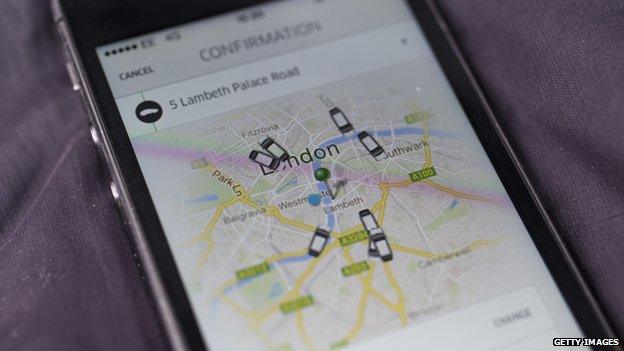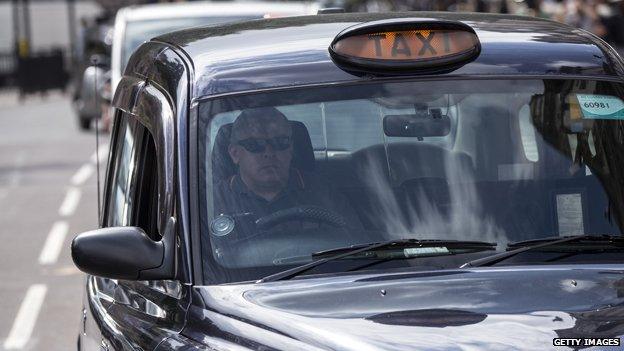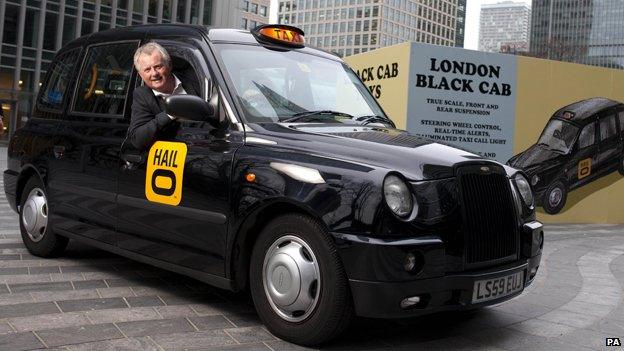Uber uber alles?
- Published
- comments

Imagine a transport business that's under five years old, but is already worth more than airlines like Easyjet or British Airways, or delivery services like TNT or Britain's Royal Mail.
You might think this was a new budget airline, or perhaps a service offering the promise of rocket trips into space - but instead it's a good old fashioned minicab firm.
But of course Uber, the San Francisco firm that has rapidly spread to more than 100 cities around the world, is not at all old-fashioned and isn't seen by its investors as being in the cab trade. Instead, it's part of the deeply hip "sharing economy", with unique technology that connects customers wanting a ride with drivers looking to minimise the time they spend with their cars empty. It describes its mission as being "to turn ground transportation into a seamless service and to enable a transportation alternative in cities that makes car ownership a thing of the past".
I'm not quite clear why this counts as "sharing" - except perhaps for the fact that the drivers share 20% of the fare with Uber - but the idea is proving hugely popular, and revenues are growing rapidly. On Friday the firm revealed that its latest funding round had raised another $1.2bn (£700m) at a valuation of $17bn (£10bn), and its backers now range from Google to Fidelity Investments.
I took a couple of Uber rides in London last week - both substantially cheaper than a black cab. I opened the smartphone app, saw there were plenty of cars nearby, and within a few minutes I was climbing in. Both drivers told me it was their very first day with the service. They had each been through a short induction session with dozens of others and then been handed a phone with the Uber app. It was up to them to supply the car, which in most cases seems to be a Toyota Prius, fuel efficiency being vital if the drivers are to make the numbers add up.
One explained that he had been a minicab driver in the West End for five years, but in recent months the work had dried up: "Even on a Saturday we were just sitting around waiting, with just a couple of fares the whole evening." The customers, he explained, had switched to Uber, so he'd decided if he couldn't beat them, he'd better join them.

And it's not just the minicab business that is being disrupted. In cities around the world, the incumbents have found Uber's arrival deeply threatening. This week London black cab drivers are to stage a protest which they say will bring the city to a halt. They accuse the regulator, Transport for London (TfL), of allowing Uber to break its rules by installing meters in cars. That's how they describe the smartphone app which uses GPS to measure the distance travelled and calculate the fare, and you can see their point.
TfL is now taking the issue to the high court to get the law clarified, but it is difficult to see the cabbies winning in the long run, any more than the textile craftsmen who smashed power looms in the 19th Century were able to stop the industrial revolution. Nevertheless, there are questions to be asked about Uber.
Will transport in London really be revolutionised in the way it claims if the streets are flooded with ever more Uber drivers battling for customers? Will this company be any more keen to pay corporation tax here than other hi-tech firms from the US west coast? And most important of all, why couldn't a British firm have come up with the same idea?
Of course, one did - it is called Hailo and was founded by a group which included three London cab drivers to put the taxi trade in touch with customers via a smartphone app. Hailo has also done pretty well and is expanding overseas. There was even talk of a stock market flotation which would have taken it straight into the FTSE 100.

Russell Hall, former black cab driver and founder of the Hailo app
But with London taxi fares substantially undercut by Uber, Hailo is beginning to feel the heat in its own backyard, and the way it is responding to that threat has angered many cabbies. Hailo has applied for a private hire licence, with the intention of offering minicab services alongside black cabs. "They've looked around the world and seen that's the way things are going - they need to offer something different," a person close to the company tells me.
Furious taxi drivers have seen this as a betrayal. There have been demonstrations at Hailo's offices, and the company admits that it has lost quite a few drivers in recent weeks. Many of the cabbies I've met have never been that enthusiastic about the app, seeing it as a necessary evil rather than a real improvement in their trade. Now Twitter accounts such as @failogrp and @Tfl&hailo-useless are calling on fellow cabbies to unite against the app.
But Hailo itself says in a blog post, "There is no point burying our heads in the sand… A taxi-only app will get isolated and customers will take their money to services without any cabs on offer. It is already happening. Let's win back that work." A clear acknowledgement then that Uber is hurting the business.
The London taxi drivers may not like the way the world is changing, and they may have a point about an imbalance in the way their new rival is regulated. But do they really think they can prosper in competition with a $17bn US company like Uber, while refusing to embrace a home-grown innovation?